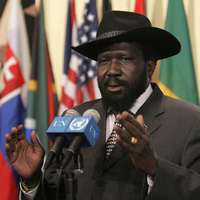In December, with a dispute over oil-transit fees between Sudan and South Sudan exacerbating already tense post-independence relations, the world looked to China to save the day. Beijing sent Special Envoy Liu Guijin to negotiations in Addis Ababa in the hopes of brokering a deal on oil revenues and facilitating a final post-independence settlement between the two sides. A month later, the crisis between and within the two Sudans continues. But the episode raises the question of whether China’s evolving Sudan policy reflects a broader evolution in its approach to African and international diplomacy.
China’s current relations with the two Sudans must be understood both in the context of its longer history with Sudan and in light of the evolution of Beijing’s engagement after the 2005 Comprehensive Peace Agreement (CPA). After having targeted China’s Sudanese oil operations during the war years, the main Southern Sudanese separatist group, the Sudan People’s Liberation Movement (SPLM), sought to bury the hatchet beginning in 2005. Only in 2007, however, when Salva Kiir -- then the president of the semi-autonomous region of Southern Sudan, now the president of South Sudan -- visited Beijing did the Chinese government appear to wake up to two fundamental challenges facing its interests in Sudan: the geography of Chinese oil interests -- some 75 percent of Sudanese oil was in Southern Sudan; and the SPLM’s independence aspirations, even if these were necessarily kept discrete due to the CPA’s legal requirement that all parties work to make the unity of Sudan attractive. From then on, working under the “one Sudan, two systems” framework that the CPA established, Beijing began to cultivate direct relations with Juba, even if attention to China’s Darfur engagement mostly overshadowed this shift.
After opening its Juba consulate in September 2008, China first hedged its bets on the outcome of the January 2011 referendum for southern independence. But though never keen on the prospect of Southern Sudan exercising its right to self-determination, in part due to the precedent this would have in Africa and indeed China itself, Beijing began to prepare quietly for the probability of independence once it recognized which way the political wind was blowing. Beijing-Juba relations subsequently developed quickly and in a variety of political dimensions, such as growing links between the SPLM and the Chinese Communist party, not to mention an initially informal engagement with China National Petroleum Corp. (CNPC). Elements in Sudan felt betrayed by China’s new friendship. Juba, however, skillfully used China to maximize its leverage against Khartoum.

